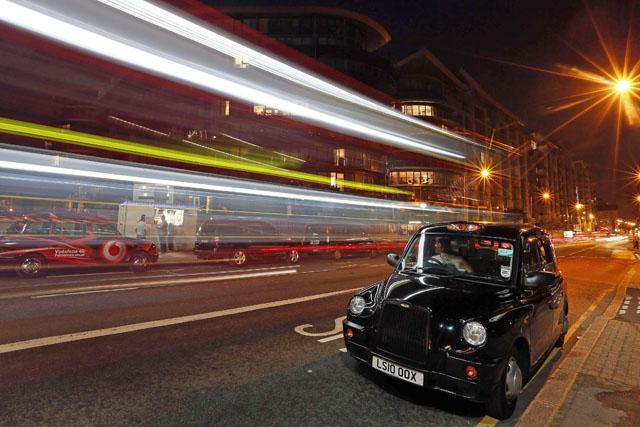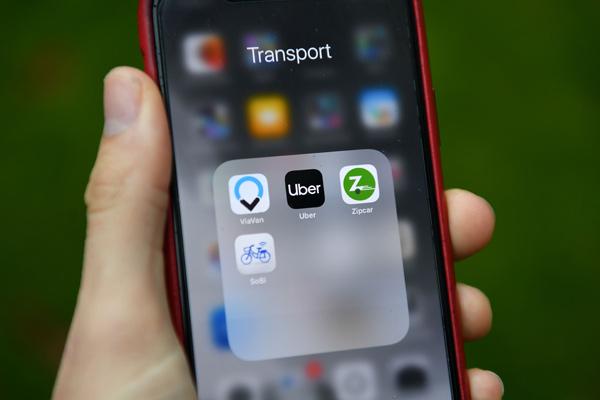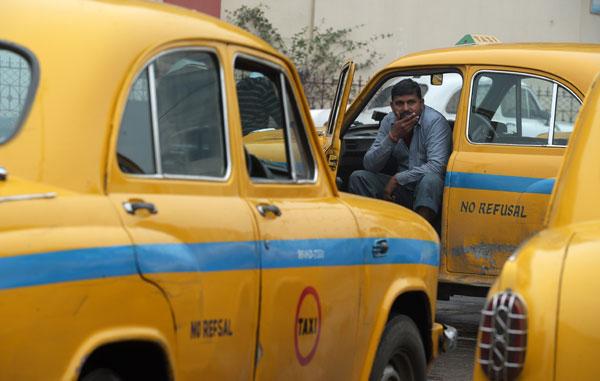You are here
Black taxis challenge US car service Uber for streets of London
By Reuters - Jun 08,2014 - Last updated at Jun 08,2014

LONDON – They have been the kings of the British capital’s roads for over a century but now the often opinionated drivers of London’s iconic black taxi cabs are battling a high-technology rival that threatens their dominance.
In their sights is Uber Technologies Inc., a San Francisco-based company whose application lets people summon rides at the touch of a smartphone button and uses satellite navigation to calculate the distance for fares.
The drivers of black taxis say Uber, backed by investors such as Goldman Sachs and Google, is being used as a taximeter and thus contravenes a 1998 British law reserving the right to use a meter for licensed black taxis.
Uber says the application used by their drivers complies with all local regulations and that they are being targeted because of their success in winning customers.
A variety of apps are available for summoning both black cabs — bulbous, purpose-built vehicles which offer a roomier passenger compartment than most normal cars — and unmetered private-hire taxis known as minicabs.
But the power of Uber and the growing popularity of its app have so rattled the black cab drivers that they have pushed London’s transport regulator to ask the High Court to rule on the legality of such applications.
They also plan to converge near Trafalgar Square on June 11 for a protest that could paralyse central London, following strikes and other actions by drivers in cities such as Paris and Milan.
“We understand it’s a competitive market place, but they’re not playing by the rules,” Jim Thompson, a taxi driver of 30 years, told Reuters during a coffee and cigarette break in the financial district. “We’re fighting for our livelihoods here. No one’s going to take it lying down.”
Since Uber’s foundation in 2009 by two US technology entrepreneurs, Travis Kalanick and Garrett Camp, the darling of Silicon Valley has entered over 70 cities, expanding from California to Washington, Tokyo and now London.
Colleagues in the US capital are suffering, said Thompson. “I was over in Washington last year and it slaughtered them,” he said. “You just can’t compete.”
Behind the debate over what constitutes a taximeter, Uber has touched a raw nerve in London because it brings home the threat to one of the city’s most visible trades from technological advances.
To win the coveted green badge giving the right to drive a black taxi, drivers have to study for up to five years to pass the “the Knowledge”. This is a rigorous test requiring encyclopaedic knowledge of London’s roads and its landmarks — from the Tower of London to the site of Karl Marx’s grave — although many drivers now use satellite-navigation devices.
First introduced as motorised competitors to the horse-drawn carriage in 1897 under Queen Victoria, there are now over 25,000 hackney carriage taxis in London making more than 300,000 trips each day.
The cabs, which are now made by China’s Zhejiang Geely Holding Group, can be flagged down on the street and use a meter to calculate fares while London’s 44,000 minicabs must be pre-booked with a set fare and destination.
Taxi wars ?
Uber says its minicabs arrive in five minutes in central London and it offers numerous incentives, including a free first journey to attract new users and allowing customers to see the driver’s name and photo before they arrive.
“You really feel you are the customer and not someone who’s just getting a lift,” said David Wetherill, an Uber customer in London. “It’s like the difference between staying in a budget hotel and a five-star.”
But Uber also provides an application for its drivers to calculate the cost of each journey by monitoring the distance and time travelled. The London taxi-drivers’ union says this amounts to a taximeter and that the regulator, Transport for London (TfL), is failing to enforce its own rules with a firm that has powerful investors.
“TfL is scared by Uber’s big-money backers like Goldman ‘Government’ Sachs and Google,” said Steve McNamara, general secretary of the Licensed Taxi Drivers Association. “Something is very, very wrong here.”
TfL says its provisional view is that the use of smart phones does not constitute a taximeter but has invited the High Court to rule on the issue.
Uber is being targeted because of its success and out of fear of its technological strength, said Jo Bertram, Uber general manager for Britain and Ireland. “We’re bringing more competition and we think that’s good for everyone,” she told Reuters at the company’s new offices in north London.
But Uber isn’t to everyone’s taste. There have already been protests against Uber in both the United States and continental Europe, and one of its cars was attacked near Paris earlier this year. Not all appear to have helped the drivers’ cause: When the Milan taxi union staged a strike in March, Uber enticed stranded customers by offering a 20 per cent discount.
The company has also faced complaints from rival taxi firms in the United States while in France a law requiring all its drivers to wait 15 minutes before responding to a booking was briefly introduced and then suspended.
In London, about 10,000 taxis are expected to cause gridlock at next week’s protest.
Related Articles
LONDON — London's transport authority on Monday refused to renew an operating licence for ride-hailing giant Uber because of safety and secu
NEW DELHI — From London and Paris to New Delhi and Sao Paulo, traditional taxi drivers united worldwide against Uber in 2015, a year that sa
The growth of ride-hailing companies such as Uber and Lyft so far has not been hindered by limits from government regulators and campaigns by taxicab competitors.



















